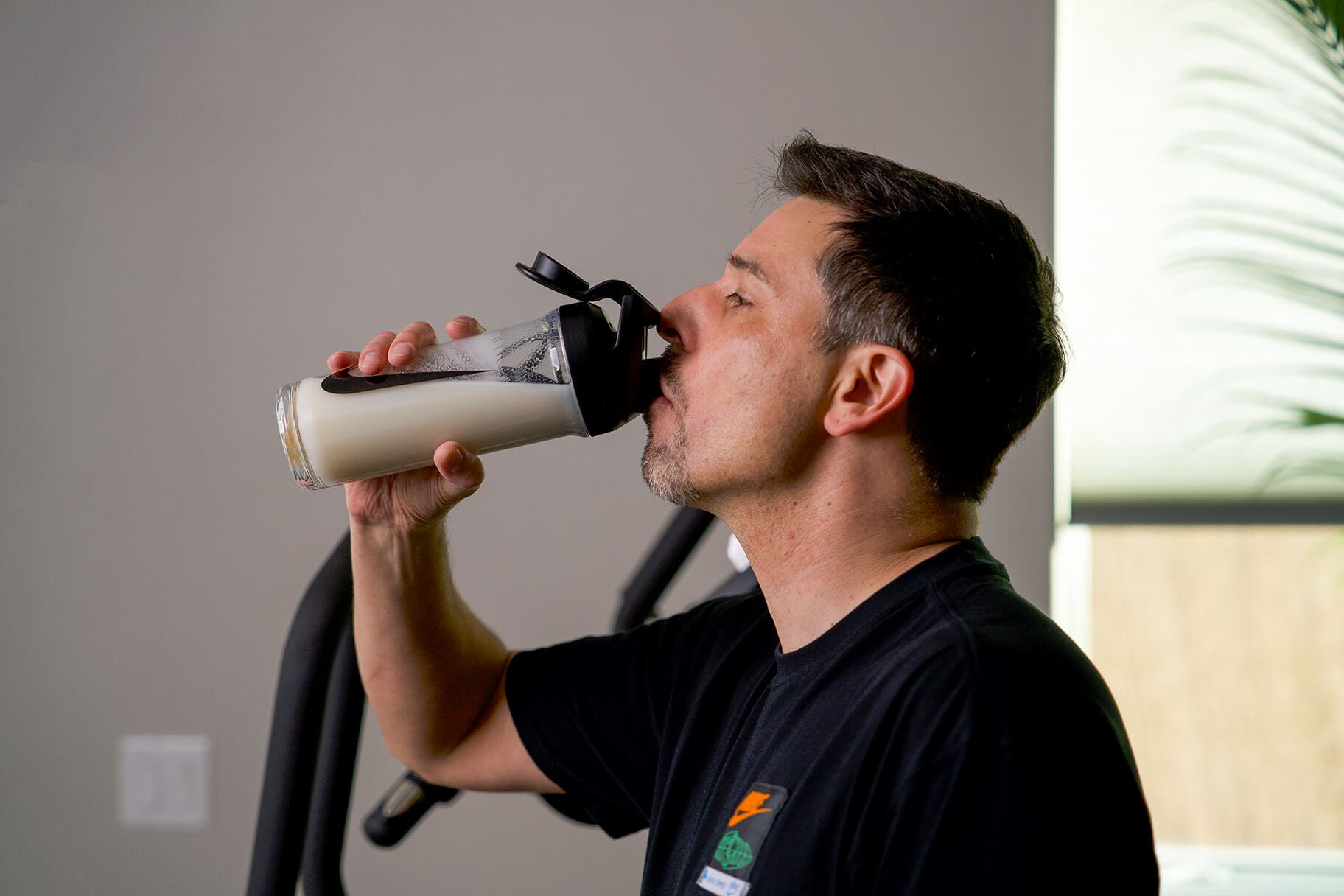When Is the Best Time To Drink a Protein Shake?
Nutrition
It depends — a registered dietitian explains how identifying your goals can help inform when to drink protein shakes.

Protein shakes can help replenish the body after a workout, making them a crucial part of many athletes’ diets. However, some folks also prefer to drink protein shakes before exercising or at the start of the day.
Choosing when to enjoy a protein shake will depend on your goals and daily habits, meaning there isn’t an ideal time to sip on one. And, to add even more factors worth considering into the mix, the type of protein included in the shake — like whey or soy protein — also matters.
Ahead, find an overview of the best times to drink a protein shake based on a range of different goals and dietary preferences. But first, check out why protein is an essential part of a healthy diet.
(Related: What Is Protein Powder? And Should I Try It?)
Why Is Protein Important?
Protein is necessary for building and preserving muscle mass, which can ultimately help maintain bone and joint health, as well as optimal metabolism. The current Recommended Dietary Allowance (RDA) for protein is 0.8 grams per kilogram of body weight, per day. However, according to the International Society of Sports Nutrition, those who lift weights regularly or who are training for an endurance event should aim to consume 1.4-2 grams of protein per kilogram of body weight per day (g/kg/d) to maintain and build muscle mass.
In general, protein should be included in almost every meal or snack to stabilize blood sugar, support muscle growth and help you feel fuller, longer. One of the main reasons athletes might want to time their protein shake? If they’re training for a specific goal, like building muscle or improving athletic performance. For these sorts of goals, it’s important to prioritize eating protein at specific times.
So, when is the best time to drink a protein shake? As it turns out, the best time to consume protein (generally speaking) is quite nuanced. Since protein shakes are a convenient way to consume a substantial amount of protein quickly, you may choose to enjoy one before a workout for energy, after a workout for recovery or as a means to meet daily protein intake goals.

When To Consume a Protein Shake: Before or After a Workout?
You may have heard that the best time to consume protein is immediately after a sweat sesh. Some research suggests that this helps to kick-start muscle tissue and cell repair during the prime anabolic window — or what some researchers believe is the optimal time for the rate of muscle protein synthesis to exceed that of muscle protein breakdown. This specific window of time is believed to occur between 30 and 60 minutes post-workout. But, other studies — such as a review in a 2013 issue of the Journal of the International Society of Sports Nutrition — challenge the validity of the anabolic window, meaning it may not even be a thing.
In fact, consuming protein for muscle growth may actually depend more so on whether you’re exercising amid a fasted or fueled state. For example, that same 2013 review suggests morning exercisers who don’t eat beforehand should eat protein within 90 minutes of completing their workout to support muscle protein synthesis. The exception? If you consumed a meal containing protein one to two hours before your workout, you might not need to prioritize refueling with protein immediately after exercise.
When To Consume a Protein Shake: To Meet Daily Protein Requirements
Protein shakes can help those who may not meet their protein requirements through food alone. There are a variety of factors that could affect this, such as specific food preferences and tastes; medical conditions that require high levels of protein consumption; or lack of access to lean protein options. However, you may also just want a quick satiating snack or small meal replacement to take with you on-the-go, and a protein shake does just that. In any of these cases, when you drink a protein shake really doesn’t matter.
However, if breakfast or lunch are sparse in protein, it may be helpful to drink a protein shake as a snack. A 2017 paper on nutrient timing suggests consuming between 20 and 40 grams of protein every three to four hours helps to ensure daily protein needs are met throughout the day. Enjoying protein-rich meals and snacks throughout the day may also promote optimal absorption and sustained satiety.

How To Pick the Right Protein Source
Just as important — or possibly more important — than the timing of having a protein shake is the type of protein found in the powder or store-bought shake. Protein shakes and powders are made from both plant and animal sources, and the quality of these proteins is not always equal. Protein quality is determined by its digestibility, bioavailability — how well the body can use the protein — and essential amino acid content.
Protein shakes made from animal proteins such as whey, are complete protein sources, as they contain all nine essential amino acids, meaning the body can’t make these on its own and require it from food. Animal-based protein powders are generally considered high quality. However, collagen protein powders are the one exception as they do not contain all nine essential amino acids.
Soy is one of the only plant proteins that qualifies as a complete protein. But, that doesn’t mean soy protein is the only suitable option for those following a plant-based diet or enjoy eating plant-based protein. Some plant-based shakes are made with a combination of pea, hemp, pumpkin or rice proteins to create a complete protein.
The main takeaways to remember: When shopping for a protein shake, take a moment to read the ingredient list and make sure the protein is coming from a high-quality source. The best ingredients will be whey or soy. Spending a little extra time reading the ingredients will make sure you get the best bang for your buck
Tips for Purchasing Protein Shakes and Powders
When shopping for a protein shake, opt for a product that has minimal ingredients listed on the label. Also, try to avoid options with added sugars or artificial sweeteners. That’s because added sugars may work against your fitness goals and artificial sweeteners can cause unwanted gastrointestinal symptoms such as gas and bloating.
In addition, consider switching or alternating the type of protein powder or shake you consume on a week-to-week or month-to-month basis to diversify the sources of protein and ratios of amino acids. By alternating protein sources, the body gets exposed to a variety of nutrients as well as different amino acid profiles.
Finally, a protein shake should serve as a supplement to a holistic diet — it shouldn’t be a primary source of protein, unless specified by your doctor or other licensed medical professional.
Words by Sydney Greene, M.S., R.D.N.





